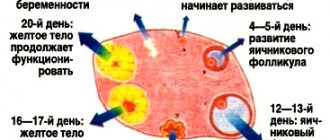It is generally accepted that the average menstrual cycle is 28 days. There are also some deviations that are equated to the norm, when the cycle lasts from three weeks to thirty-five days. If menstruation occurs 2 times a month, the reason for this may be unclear to the woman.
Age-related changes and hormones
It is the reproductive system of every woman that is responsible for procreation. The menstrual cycle, which is considered normal, should be 28-29 days. Since conception does not occur, the endometrium of the uterus is cleansed naturally. This phase repeats again.
The female body can be compared to a standard alarm clock. After all, every month sequential processes take place in it according to a clearly defined schedule.
A failure in the system may indicate the following pathologies:
- If menstruation comes 2 times a month, then we can talk about age-related changes in the female body. A similar phenomenon is very often observed in adolescents when the cycle is just forming. Women during menopause can also menstruate twice a month. Doctors call both periods crisis periods. After all, it is then that hormonal changes occur in women. It is best to visit the gynecologist several times during this period so as not to self-medicate to the detriment of the body.
- Hormonal levels can change not only at a certain age. Failure of the endocrine system can cause hormonal imbalance. In this case, you do not need to rely only on the advice of a gynecologist. A woman needs to visit an endocrinologist. If the thyroid gland does not contain nodes and other pathological processes do not occur, then hormones can be normalized with herbal preparations or certain medications. Age imbalance can stabilize on its own over time.
Menstruation can occur twice a month after an abortion or childbirth. All these phenomena can expose the female body to a stressful state, which will result in poor immunity and changes in the amount of hormones. After an abortion, you should not be surprised if you have periods three times in one period.
- The answer to the question why menstruation comes 2 times a month may be the presence of a foreign body in a woman’s body. In this case, we mean the spiral that is located inside the uterus. Such bloody discharge may not be menstruation, but ordinary bleeding. In this case, you should immediately contact a gynecologist, who will most likely insist on removing the foreign object.
- The ovulatory phase can also cause menstruation to appear a couple of times in 30 days. During this period, destruction of the follicle membrane is observed. The result can be damage to capillary vessels. The nature of this discharge may differ from the standard menstrual cycle. The color of the mass is brownish, and the volume of liquid released is less than during the normal process.
- Hormonal contraceptives also leave their mark. It is medications of this kind that can cause menstruation 2 times a month. The adaptation of the girls’ bodies can take several months. After which the menstrual cycle should stabilize. If this does not happen, then you need to consult a doctor.
Comments
Dear readers - your opinion is important to us! You can leave your feedback on how your menstruation proceeds after 45 years in the comments; your opinion will be useful to other users of the site!
Recently I began to notice that my periods have become more abundant, although before they were practically non-existent. Now I decided to see a doctor, and the study revealed the onset of menopause. I am currently undergoing a rehabilitation course to restore women’s health.
Elena
Yes, I also thought that my periods were normal, but after visiting the doctor it turned out that inflammation of the endometrium occurred due to an infection. They prescribed treatment and prescribed the necessary medications. Now I monitor the slightest changes in the body, since it is better to prevent a disease than to treat it later.
Marina
https://youtu.be/MUoGPBnrsfQ
Main signs of pathology
Menstruation, which occurs several times a month and is accompanied by pain in the lower abdomen or a woman’s discomfort, can become a sign of the appearance of certain pathologies. These include:
- The presence of benign formations. Indeed, in this case, the level of hormones can increase sharply, and consequently, the discharge itself can change.
- Malignant formations. A tumor of this kind is accompanied by malignant organisms, which cause menstruation. However, the discharge in this case is only conventionally called menstruation.
- Inflammation of the pelvic organs. This point includes not only inflammation of the fallopian tubes and the ovaries themselves, but also erosion of the cervix, as well as adenomyosis. Very often, a woman does not perceive such spotting as a threat to the whole body and health in general, but only positions it as simple menstruation.
- Presence of an ectopic pregnancy. In this case, the embryo develops in the fallopian tube, never reaching the woman’s uterus. As a result of increased pressure, bleeding occurs. At the beginning of pregnancy, pain is not felt, and spotting is mistaken for simple menstruation. After a certain period of time, the pain will become noticeable, and overall health will worsen. In this case, you cannot do without the help of a surgeon. If the cleansing of the body is delayed, then a woman can become completely infertile.
Premature menstruation can occur for a variety of reasons.
Regardless of the hormonal aspects of the appearance of menstruation several times every 30 days or a crisis period in women, it is necessary to pay attention to personal well-being and health, visit a gynecologist at the first ailment and not thereby prolong the course of inflammatory processes in the body.
Reasons why menstruation may occur 2 times a month
In order to determine whether twice monthly periods are the norm or a deviation, it is necessary to objectively assess the duration of the usual menstrual cycle. By doing simple math, you can calculate the number of days from the end of one period to the beginning of the next. If the indicator is less than 30 days, then the answer to the question is obvious.
Experts note a number of factors:
- adolescence;
- preparing the body for menopause;
- hormonal imbalance (hormone imbalance);
- improper use of contraceptives and installation of an IUD (intrauterine device);
- regular stressful situations and depression;
- the presence of diseases and pathologies of the uterus.
The menstrual cycle is disrupted after an abortion, after a miscarriage or childbirth. Under such circumstances, discharge appears repeatedly per cycle, which is not considered a serious abnormality or symptom of disease. However, this should not be considered the norm. A timely consultation with a specialist will eliminate suspicion and prevent the possible development of serious diseases. The exception is women with pathology in the form of a blood clotting disorder.
Recommendations from experts
First of all, when menstruation recurs within 30 days, a girl should pay special attention to the symptoms that appear and her general well-being. You should be concerned if a woman feels drowsy, tired and dizzy throughout the day.
Maintaining a special menstruation schedule will help save the situation. With it you can find out when ovulation occurs.
Don't forget about regularly scheduled visits to the gynecologist.
Causes of hormonal imbalance
The following factors and conditions can be identified as reasons for the absence of menstruation for 2 or more months:
- If no more than a year has passed since the start of the first menstruation, this may mean that the cycle has not yet fully formed. Sometimes the formation of the cycle can take a long time, especially if the teenage girl’s weight is below normal;
- A diet was followed, as a result of which several kilograms were lost. For the body, such a deviation in the diet is a serious stress - you need to turn on natural defenses; pregnancy during a hungry period is dangerous for it. Each body reacts to weight loss individually. In some cases, it is enough to lose 2-3 kg, and the central nervous system will give the command to the ovaries to block menstruation;
- The body may have exactly the same reaction to weight gain if it considers that going too far poses a danger to a future pregnancy;
- Climate change and long journeys affect the menstrual cycle;
- Violations of the usual routine;
- When a girl moves from one stage to another - from a girl to a woman, disruptions in the menstrual cycle may occur;
- Reasons for the absence of menstruation include one-time stressful conditions, emotional dissatisfaction, depression;
- Irregularity of the cycle is caused by gynecological diseases and incipient oncological processes;
- A delay of 2 months in menstruation may well occur if you stop taking hormonal contraceptives - the body does not have time to readjust. In this case, bleeding may also occur or bleeding may occur for a long time;
- Don't worry if your cycle doesn't return immediately after giving birth. Menstruation may begin after a year, especially if you continue to breastfeed;
- Constant cycle instability is a symptom of hormonal disorders; the pituitary gland needs to be checked;
- The time of menstruation increases or decreases, the intervals between them lengthen or shorten during hormonal decline - as menopause approaches. Menopause does not occur immediately; it “warns” of its approach, sometimes several years in advance.
It is impossible to figure out the reason why periods are irregular without special examinations. To compile an accurate picture, the following are prescribed: general tests, gynecological tests, hormone analysis, biochemistry, ultrasound examination of the gynecological organs and thyroid gland. Sometimes a biopsy result may be required.
Methods for normalizing the hormonal cycle
After we have found out why there have been no periods for 2 months, specific treatment is prescribed. It’s worth clarifying right away - the cause of hormonal imbalance is not always possible to find out.
- One way to normalize the cycle is to prescribe hormonal drugs. The treatment regimen for medications containing hormones is prescribed by the doctor. A lot of women - especially those whose age is already approaching 40 years old - are afraid to take hormonal drugs or cannot use them due to existing chronic diseases. In these cases, products with phytohormones come to the rescue - natural preparations that contain extracts and extracts from plants that contain special substances. They work in a similar way to female hormones and are easily absorbed by the body. By the way, there are much fewer side effects when using them.
- Sometimes, to normalize the condition, it is enough to change your daily routine, switch to a rational and proper diet, start taking vitamins and polyminerals in the form of a tablet complex, and start playing sports.
- When there is no menstruation due to gynecological problems: the presence of inflammatory diseases or sexually transmitted infections, then you need to undergo a course of anti-inflammatory and antibacterial therapy.
- If the delay is more than a month, and menstruation after a long break is too heavy, with large clots, or blood appears during the intermenstrual period, and severe pain is observed during menstruation, a visit to the gynecologist is necessary for such problems.
- You should also visit your doctor when the interval between cycles is less than 3 weeks.
The human body is a very complex system. A failure can cause not only serious illness, but also disturbances in the emotional state. The female body reacts especially sensitively to the influence of external factors. Therefore, if there are changes in the functioning of such a complex system as the hormonal system, it is imperative to seek medical advice.
The materials posted on this page are informational in nature and intended for educational purposes. Site visitors should not use them as medical advice. Determining the diagnosis and choosing a treatment method remains the exclusive prerogative of your attending physician.
Menstruation in a teenager
When menstruation ends and starts again in teenagers, there is nothing to worry too much about. Unstable hormonal levels can cause deviations in any direction. Their absence for 3 months, as well as their arrival ahead of schedule, is considered normal. However, if the situation repeats itself repeatedly, the girl should be shown to a specialist.
Heavy periods with clots began
If after the next menstruation heavy periods begin, and even with clots, you need to be wary. First of all, it may mean a pregnancy failure. Secondly, a gynecological disease such as uterine fibroids, polycystic ovary syndrome, the presence of cancer cells. It is necessary to look for the cause of an incomprehensible phenomenon together with a doctor.
What to do in case of repeated periods
If critical days occur for the second time during the cycle, you need to consistently exclude all possible causes. If a woman has encountered this for the first time, she needs to monitor her well-being. You should be wary of rapid fatigue, headaches, drowsiness, surges in blood pressure, and heartbeat disturbances.
Repeated extracurricular discharge is a reason to start maintaining a basal schedule. It will help you figure out what happens with ovulation. The onset of critical days can be triggered by repeated maturation of the egg or shortened phases.
Taking any medications without medical examination is not recommended.
Non-pathological causes of repeated menstruation
The period of adaptation of the body to hormonal contraceptives is another reason for unexpected discharge. They usually occur in the first months after starting treatment. In such cases, the cycle adapts to the new hormonal background formed by the drugs. Such “menstruation” is similar to normal, but more scanty.
Sometimes menstruation comes again after surgery: diagnostic or abortive. The body thus reacts to a violation of the integrity of the endometrium or interference with the natural hormonal balance.
Restoring the cycle after childbirth also sometimes leads to an increase in menstrual periods due to fluctuations in estrogen levels.
In these cases, the reasons for repeated periods are usually obvious, as they are associated with certain events and actions. It is extremely rare that the second menstruation in a month appears after repeated ovulation. It occurs as a result of the production of the next egg by the ovaries immediately after the maturation of the previous one. The possibility of conception in such cases remains during critical days, since they are accompanied by the next ovulatory cycle. The next period occurs 10–12 days after the end of the previous one.
Period in a week
The cause of this phenomenon may be diseases of the reproductive system and endocrine system.
Severe stress can cause repeated periods. Brown discharge is present when taking birth control pills. They are a symptom of inflammation in the presence of an intrauterine device. A doctor will help you figure out the cause. Doing this on your own is problematic. For women who are preparing to go through menopause, the situation is quite normal. There is no discharge for several months, then it appears and is smeared after a week or at another time. Hormonal imbalance is constantly present. Depending on which hormone predominates, menstruation is either delayed or comes very often.
What menstrual cycle is considered normal?
There are two phases in the menstrual cycle - follicular and luteal. During the follicular phase, the egg matures and is then released from the follicle at ovulation. This phase begins on the first day of menstruation. It is replaced by the luteal phase, during which a hormone-producing gland, the corpus luteum, forms in place of the egg.
Under the influence of hormones (including progesterone), preparations for conception and pregnancy begin in the female body. It consists of the following processes:
- other follicles stop developing for a while;
- the epithelial tissues of the uterus, into which a fertilized egg is implanted in the future, increase in size, and the network of blood vessels grows;
- the immune barrier is weakened to prevent embryo rejection;
- ducts enlarge in the mammary glands.
If conception does not occur, the corpus luteum dies, and with the arrival of menstruation the next menstrual cycle begins. A normal menstrual cycle usually lasts from 28 to 32 days. Minor deviations are allowed - cycles of 21-35 days are not considered a pathology.
Indications for a visit to the gynecologist
Dark red color of discharge during menstruation is considered normal. Towards the end of menstruation, the discharge may turn brown due to oxidation of the blood. Scarlet blood color that does not change for 4-5 days during repeated menstruation signals uterine bleeding. In this case, you need to visit a doctor without delay. After diagnosis, he will prescribe hemostatic drugs.
If menstruation occurs two weeks after the previous one and is accompanied by cramping pain in the lower abdomen, you should immediately call an ambulance. This is most often the case with an ectopic pregnancy.
Period in 3 days
The situation occurs due to the maturation of several eggs, due to diseases of the reproductive system.
Chronic endometritis. It is characterized by the penetration of infection, as a result of which the menstrual cycle is disrupted, periods are initially scanty, then extremely heavy, lasting longer than usual. The cause of chronic endometritis is untreated polyp disease, PPP disease. Repeated menstruation occurs on any day of the cycle.
Hypothyroidism. The disease is associated with pathology of the thyroid gland. Hormonal imbalance leads to changes in the reproductive system. Menstruation does not come on time, it happens several times in one cycle. The woman will have to take hormone tests and undergo an examination.
Ectopic pregnancy. The embryo does not develop in the uterine cavity, but in the tubes. Practically does not interfere with the normal course of the menstrual cycle. Menstruation comes with a slight delay, either fully or with a slight deviation. After a few days, the embryo begins to be rejected, bleeding appears, which the woman again mistakes for menstruation. If your period ends and starts again, it is recommended to immediately seek help from specialists.
Uterine fibroids. In the initial stages of the disease, the only symptom is menstrual irregularity. A benign tumor occurs due to hormonal imbalance. Menstruation changes beyond recognition. The discharge is scanty, abundant, long-lasting, short. The situation can be completely different. Ointments are present throughout the month. The impression arises that your period is over and has started again.
Endometriosis. Characterized by excessive growth of the endometrial layer. Menstruation profuse. The cells infect the lining of the uterus. She begins to bleed constantly. Including 3 days after the end of menstruation.











